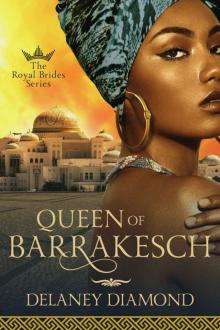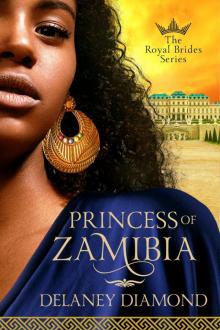- Home
- Delaney Diamond
Queen of Barrakesch Page 3
Queen of Barrakesch Read online
Page 3
“Aren’t you the woman who punched your last suitor in the nose?”
Her eyes widened. “Who told you that?”
“Kofi.”
“Oh. He hit me, so I hit him back.” She shrugged.
Imani was the only female child in her family. Between her mother and her father’s two other wives, she had six brothers. She’d learned to fight, including box, since she was young. Since she was a member of the Mbutu tribe, the fiercest and most warlike of the nine tribes of Zamibia, her ex should have known better. What did he think would happen when he put his hands on her?
Though she could take care of herself, if Wasim had been anywhere near, the man would have gotten much worse than a punch. Wasim would have put him in the hospital.
“You’ve always been very good at getting rid of the men in your life,” he remarked.
“You make it sound like it was my fault,” Imani said.
“Not at all. I find your ways to be very efficient. You don’t waste time getting emotional about the decision. You do what needs to be done. Like the one before him—he cheated on you, did he not? And you dumped him right away instead of wallowing in nostalgia and listening to his excuses.” He picked up his tea, which he’d completely forgotten about during their conversation. The minty, warm liquid coursed down his throat.
“There was no excuse for what he did. He had to go.”
“And what about the one before that?” Wasim asked, setting the cup back on the table.
“Too weak.”
“I see. And the one from Mozambique?”
She laughed. Such a lovely sound. “You know way too much about my love life, but to answer your question, we mutually agreed to split. We had no chemistry.”
“Do you ever plan to get married?”
“Of course,” Imani said.
“And what do you want in a man?”
They’d never had this type of conversation before, and he wasn’t even sure why he’d taken it in this direction except that he wanted to know more about her needs and wants. A certain restlessness had pervaded him of late, and she was at the center of it.
“Planning to set me up with someone?” Imani asked.
“Depends on what your answer is. I have to be considerate of my friends.”
She shot him a dark look, and he stifled a laugh.
Imani surveyed the property for a bit, seeming to really think about her answer. “I want a man who is smart, funny, good-looking, but he doesn’t have to be a head-turner. He should be good with children, too, and…”
“Able to handle you?” Wasim supplied.
“I don’t have such lofty expectations. There’s not a man alive who can handle me.”
He let loose his laughter this time.
She smirked. “And you? What are you looking for in a future wife?”
“I’m not looking for a wife.”
“You will eventually. You are, after all, the oldest son of King Khalid. Eventually you’ll be king and you’ll need heirs. You’re not getting any younger, so what’s the delay?”
He didn’t have an answer. He didn’t know why he had delayed for so long except that the women he’d met over the years didn’t measure up, and as each year passed, his father became more concerned about his unmarried status. He worried, too, about his antics abroad.
Wasim took advantage of his lack of notoriety outside of the Arab world. Though he always traveled with bodyguards, they were unobtrusive when he wasn’t on official business, and dressed in Western clothes, he easily blended in.
He did activities like take public transportation and eat street food, the latter being a cause of great concern for his family and the aides traveling with him. But what was the point of being the son of a king if you couldn’t enjoy what the world had to offer—both great and small? One day he wouldn’t be able to take such trips, and until then, he intended to enjoy himself.
“I’ll marry when I’m ready.”
“And when you’re ready, what will your princess look like?”
He sat back for a moment and seriously considered the question. “She must be funny, intelligent, and able to carry on a good conversation. Knowledgeable about politics and world events, and she must be able to handle me.”
“Hmm, that poor woman.”
“Obedient.”
Startled, Imani repeated, “Obedient?”
He was kidding, but her expression was amusing. “This is my fantasy wife, remember? Can I finish?”
She gestured with a hand for him to proceed.
“Compassionate and like your ideal man, good with children. Someone who can play and laugh with them.”
“I assume you’re finished now?” Imani asked.
“And obedient.”
“You said that already.”
“It’s worth repeating because it’s very important.”
She narrowed her eyes at him.
Wasim pretended not to notice her glare and tapped his middle finger on the table. “Let’s see…I think that’s it for now.”
“Good luck finding that fantasy,” Imani muttered.
“Good luck finding yours.”
“I don’t need luck. I’ll simply be patient.”
“I’m sure your patience will pay off. There are many men looking for a woman like you—intelligent, strong-willed, and sure in her convictions.”
“You think so? Women like me have a hard time finding a good man.”
“Perhaps women like you are looking in the wrong place.” His answer forced her into silence, and she studied him across the table. “But you don’t have anyone in mind right now?”
She shifted in the chair. “Not since the last fiasco, but my parents are now talking about an arranged marriage.”
Wasim froze, body going perfectly still. “When did that happen?”
She lifted one shoulder dismissively. “The option has always been on the table, particularly where my father is concerned, but I’ve told them I’m not interested in them setting me up.”
“Why not?”
“Like I told you before, that’s the old way. I want to find my own husband. I want to be in love when I marry.”
“And that’s part of the fantasy?” Wasim asked.
“Falling in love is not a fantasy.”
“Don’t you believe that two people can be happily married even if they’re not in love? Both of us have parents whose marriages were arranged. It’s not necessary to love first if you’re compatible.”
“For me it is. Otherwise, the marriage is more like a business arrangement, and I couldn’t be happy in a relationship like that.” She wrinkled her nose. “Besides, I think I’ve found a man already.”
The tightness in his body increased. “You have? You just said there was no one.”
“There is.”
“And you’re in love with him?”
“I like him and believe I could come to love him once we start dating. He’s a businessman from Senegal. We met a while back.”
“I vaguely remember you telling me about him. Abdou something, isn’t it? He’s not worthy of a woman like you,” he said gruffly.
“Well, lucky for me, you don’t get to choose my husband.”
Despite their commonalities, they also had many differences between them. Imani was Christian, he was Muslim. Her permanent home was in Africa and his in the Middle East. Now, another one. Where she believed falling love was integral to a happy marriage, he didn’t hold the same belief.
That thought unsettled him deeply, but rather than voice his opinion, he remained quiet and took another sip of tea.
4
In the back of a limousine on the way to The Grand White Palace, Wasim reviewed his notes in preparation for the meeting with his father. The final figures had come in last night, and he’d plugged them into the spreadsheets and had Talibah print copies of the report for him, his father, and Akmal.
Under normal circumstances, the reviews would be done via electronic tablets, but
his father was old-fashioned and preferred to have the weight of papers in his hands. Wasim had been very impressed with Cairo Metro, the first constructed rapid transit system in the Arab world. He’d also learned quite a bit in Dubai and especially Paris, whose extensive system of lines and stations was one of the oldest in the world.
His attention was drawn outside the window to a red tour bus rolling along the highway, a reminder that tourism revenues had become a larger line item in their budget in recent years—the very reason they were exploring expanding public transportation.
Having more people come to the country was a good thing. From experience, he knew that outsiders mistook their traditional dress and codes of conduct as an indication that they were a backward nation. They expected to see camels and souks and horse-drawn carts. While those existed in some of the older areas, where the ancient streets were narrow and the Ministry of Historical Preservation maintained the authenticity of relics from the past, the country was crisscrossed by modern highways and glass skyscrapers. Throughout Barrakesch, ancient and modern coexisted.
The limo cruised to a stop at the checkpoint with armed guards dressed in military gear before driving another two miles down a winding road with palm trees on each side. At the end of the road, the splendor of the palace loomed before him.
Consisting of six floors with hidden passageways, elevators, and grandiose designs that included imported marble and decorative touches trimmed in gold, The Grand White Palace was located in Kabatra and a short distance from the city’s harbor.
Heavily guarded, the palace was a symbol of wealth, as well as paid homage to the region’s aesthetic. The large doors at the entrance were designed in typical Islamic architecture with the family emblem of a resting falcon at the top. As of five years ago, on Mondays and Wednesdays visitors could tour sections of the compound and inside the palace.
The Grand White Palace was not only the home of King Khalid, his two wives and their children and their children, but where several government offices were located, including an office where Wasim sometimes worked. The king also met with his advisors there, and once a month citizens could come to plead their cases to the king in The Great Hall of Appeals—asking for leniency on prison terms on behalf of loved ones, economic relief, to settle land and business disputes, or other matters of importance.
Wasim’s older sister, Yasmin, was exiting with her four-year-old son as he entered through one of the side doors. She wore her raven hair cascading down her back, black slacks, and a long-sleeved blouse whose coral color complimented her skin tone.
“Khali!” his nephew said, his eyes brightening.
“And where are you going?” Wasim asked, lifting his nephew, Malak, into the air.
The little boy giggled. “Me and Ummi are going to meet Baba for lunch.”
“Sounds like fun. Bring me back some kanafeh, okay? I haven’t had any in a while.”
“Okay!” his nephew said with an enthusiastic grin.
He kissed Malak on the cheek before setting him on the ground.
“Going to see Father?” Yasmin asked.
“Yes. He, Akmal, and I are going to review the reports from my trip.” He held up the folder that had been wrinkled a bit when he lifted Malak. “What’s the occasion for lunch?” he asked.
“Farouk and I have a meeting downtown about one of his latest projects, but he’s taking us to lunch first. I’ll take Malak to a friend’s while we’re in the meeting.”
Farouk always included Yasmin in his business dealings, trusting her judgment and ability to read people. His construction company had been modestly successful when he met her, but since marrying, the business had grown by double digits every year. Partly because of his connections to the royal family, but also because of Yasmin’s input.
“And which project is this?”
“The new Hilton Hotel on the other side of town.”
He knew that project. It was a huge undertaking—easily the biggest of Farouk’s career. No wonder he wanted Yasmin present.
“And look what he bought me.” She tucked her hair behind her left ear and showed off the diamond stud.
Wasim whistled. “Very nice. What’s the occasion?”
She shrugged, a blush of pleasure on her cheeks. “No reason. Just because.”
He almost wanted to call Imani and say See, here is another arranged marriage that’s working just fine.
“He spoils you too much,” Wasim teased.
“There is no such thing,” Yasmin said loftily. “You could never be too good to a woman. Remember that.” She strutted across the tiled courtyard toward the vehicle idling nearby. Malak waved goodbye and Wasim waved back.
They disappeared within the Lexus SUV, and Wasim entered the building. One of the staff handed him a wet towel that he dabbed against his face to cool off from the heat. Then he took the elevator to the top floor and entered his father’s quarters. There, an aide removed his sandals and replaced them with a pair of slippers. He escorted Wasim toward the glass-enclosed balcony where his father sat in a chair covered in gold and oxblood fabric.
He didn’t announce his presence, and King Khalid didn’t notice he had arrived. The older man stared out at the water, which at this time of the day, with the sun high in the sky, glinted like diamonds had been scattered across its surface.
Wasim noted with a bit of alarm that his father’s robes hung more loosely on him, an indication that he’d lost more weight. He would need to have a stern talk with him about this vegan diet he’d adopted. For health reasons, he’d said, but Wasim didn’t like the rapid weight loss. He and Yasmin had discussed their father’s appearance once before, and he’d bring it to her attention again so they could address the issue with him.
The king seemed to be focused on his yacht moored in the water, but Wasim suspected that he wasn’t really looking at it. Under the ghutra and long beard peppered with gray, he seemed…aggrieved. The expression on his face pricked Wasim’s heart, and he wondered if he was thinking about Wasim’s mother again. The anniversary of her death would be in a few weeks.
King Khalid’s second wife, her children, and staff resided on the fifth floor in the east wing. His third wife resided on the fourth floor in the east wing. He lived on the top floor in his own apartment, alone ever since his first wife, Wasim’s mother, had tragically drowned. Twenty-six years had passed since her death.
At one time, Wasim had assumed his father had moved on. But after he hadn’t moved either of his new wives into the queen’s apartment on the sixth floor, he realized his father had not. His new wives had kept him from being lonely over the years, but they’d never replaced her in his heart.
He moved closer and his father glanced over at him, his face brightening.
“As-salamu alaikum, Walidi.” He bowed slightly.
“Wa alaikum assalaam.” King Khalid opened his arms, inviting him in for a hug.
Wasim embraced him, noting again the lack of bulk in his body since the last time he’d seen him. “You looked deep in thought.”
King Khalid nodded. “I was. Thinking about a lot of things.” His tone sounded rather serious—downright grave. He waved at the food spread out on the table between them. “Have something?”
Wasim shook his head. “I ate an early lunch, but I’ll have a drink.”
King Khalid called for one of the servants standing nearby, who immediately filled a glass with jellab and then stepped back, inconspicuous against the window.
Wasim sipped the cold drink in appreciation. Then he handed over one of the reports to his father. “Where is Akmal?”
“Running late, as usual,” his father replied, pursing his lips in annoyance. “At least he called this time.”
There was nothing his father hated more than tardiness, and Akmal seemed bound and determined to make his blood pressure spike by constantly showing up late to meetings and events. He was young—only twenty-five—but not too young to know better.
“Everything set fo
r the technology expo in a couple of weeks?” his father asked.
“Yes. So far, so good. I’m convinced it’s going to be a success.”
This was a project he’d been planning for years—to have an expo that focused on technology—highlighting innovations in cybersecurity, high-tech, and robotics, and bringing together companies from the Arab world to create partnerships. But his vision had taken on a life of its own and become larger than expected, pulling international interest that expanded the attendees well beyond his expectations.
“Good. I won’t be able to attend, but you don’t need me there anyway, this is your project.” King Khalid set aside the report. “Before we get started with that, I wanted to talk to you. Alone.”
As he dismissed the servants hovering nearby, unease settled in the pit of Wasim’s stomach. The other night when he’d gotten the message he’d immediately sensed that something was wrong but had brushed aside his concerns since then. Now they resurged anew.
When they were alone, his father looked at him, his expression so morose—so defeated—panic clutched at his abdomen.
“Walidi, what is it?” Fully focused, Wasim set aside his report.
“I don’t know how to say this. I haven’t gotten used to the idea myself.”
The smile he gave Wasim wavered at the corners. Wasim couldn’t smile back at all, and the sense of panic only increased, tightening to pain in his chest.
“I’m sick, Wasim. Very sick.”
“Sick? How? What’s wrong?”
“I’m in the advanced stages of pancreatic cancer.”
What? Wasim’s lips formed the question but never uttered the word aloud.
“I was diagnosed several months ago, and since then we—my doctors and I—have tried to find a way to make this go away through alternative treatments. I told them I do not want chemotherapy.”
“That’s why you changed your diet?”
He nodded. “I thought it would help. I was willing to try anything.” He sighed heavily.
“Why didn’t you tell us? Me, at least?”
“I didn’t want to worry you, but the cancer is in the advanced stages. They don’t give me much time.”

 Deeper Than Love (Brooks Family Book 6)
Deeper Than Love (Brooks Family Book 6) Queen of Barrakesch
Queen of Barrakesch A Powerful Attraction (Quicksand Book 1)
A Powerful Attraction (Quicksand Book 1) Until Now (Plan B Book 1)
Until Now (Plan B Book 1) The Friend Zone
The Friend Zone What She Deserves
What She Deserves Princess of Estoria (Royal Brides Book 2)
Princess of Estoria (Royal Brides Book 2) Two Nights in Paris
Two Nights in Paris Love Me (Irresistible Husband)
Love Me (Irresistible Husband) Seasoned
Seasoned A Passionate Love
A Passionate Love Without You (Quicksand Book 2)
Without You (Quicksand Book 2) More Than a Mistress (Latin Men Book 5)
More Than a Mistress (Latin Men Book 5) Never Again: a second chance romance (Quicksand Book 3)
Never Again: a second chance romance (Quicksand Book 3) The Rules
The Rules Here Comes Trouble
Here Comes Trouble A Hard Man to Love
A Hard Man to Love Princess of Zamibia
Princess of Zamibia Still in Love
Still in Love Passion Rekindled
Passion Rekindled One of the Guys
One of the Guys Unforgettable
Unforgettable Hot Latin Men 1-5 Omnibus
Hot Latin Men 1-5 Omnibus Private Acts
Private Acts The Blind Date
The Blind Date Fight for Love
Fight for Love Worth Waiting For
Worth Waiting For Wild Thoughts
Wild Thoughts That Time in Venice (Love Unexpected Book 6)
That Time in Venice (Love Unexpected Book 6) Heartbreak in Rio
Heartbreak in Rio For Better or Worse
For Better or Worse The Ultimate Merger
The Ultimate Merger Perfect
Perfect